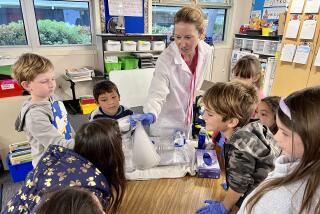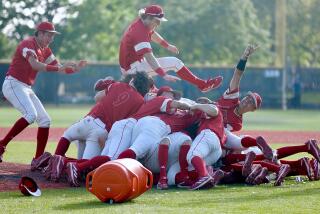The Art of Making Science Fun
- Share via
MOORPARK — Donning safety goggles, Erika Saldivar, 11, aimed at her target--a penny behind a small piece of glass.
*
“Three, two, one, fire!” she said, blasting a pinhole through the penny with the laser equipment at Moorpark College.
“This is better than school,” said Erika.
She is one of 33 Moorpark middle school students who gave up their few remaining summer mornings last week to participate in the Math and Science Exploration program.
“It’s hands-on, you don’t have to take tests, and you don’t have to worry about getting good grades,” Erika said of the program, which is sponsored by the college and the Moorpark Unified School District.
Erika then followed her classmates out to a field at the college, where they planned to launch model rockets into the clear blue sky.
The program is one of several joint ventures between the college and Chaparral and Mesa Verde middle schools.
“With budgets being really tight, we have a real need to cooperate with the college, community and businesses,” said Vishna Herrity, who coordinates programs for the Moorpark district.
“I’m not talking about just financial support. I hope that we can continue to foster educational programs and experiences throughout the school year.”
The college already invites students in the Moorpark district to its multicultural fair, and two years ago, the Chapparal student band played at the college’s graduation.
Last year, the college and school district formed a committee to plan more programs involving the two schools. The exploration program is the first of several this year. Diane Moore, college vice president of instruction, said the program was so successful that her institution is planning another one next year.
“When talking to the students, I found that they want to do another one that would be twice as long,” she said. “This is a chance to share resources that we have and to enhance these students’ lives.”
*
Other cooperative efforts planned between the middle schools and the college include providing students with free tickets to football games, inviting them to campus events such as the college science exploration day, and having international students visit the schools to talk about their countries.
“We can learn a lot from this collaboration,” Herrity said. “It’s hard to do everything by yourself in a vacuum. Certainly the college has resources, like the laser lab, that middle school students wouldn’t have normal, daily access to.”
College lab technician Scotty MacLeod said he enjoys sharing the laboratory equipment with the younger students.
“This enthusiasm is something you don’t always see in older students,” he said, pointing to the middle school students. Scattered on the field under the hot sun, they were poised to track a rocket at liftoff and chase it to its landing.
Clint Harper, professor of physics and laser technology and also a member of the Moorpark school board, said programs like the one last week are especially important when it comes to introducing students to science.
*
He said studies show that many students are turned off by science toward the end of elementary school. He said catching them in junior high may spark their interest again.
“This gets them involved in science,” he said. “It shows them it’s not just for nerds. There’s more to it than just sitting and working out problems for homework.”
Harper is one of four professors who volunteered for the program, in which the students measured earthquakes, toured a garden of native plants, figured probability using darts, made timers and capped off the week by launching the rockets. Chris Bucka, 13, a Mesa Verde eighth-grader, said the experiments made the week well worth it.
“When you hear we’re going to have a science lab in school, everyone jumps for joy because they’re so rare. This is really hands-on,” said Chris, who said he hopes to be an acoustical engineer like his father.
“It was one of these types of programs that got me involved in the sciences when I was 12,” Harper said, recalling how his project on the distillation of crude oil stank up the whole room.
“An after-school program was the turning point for me.”
More to Read
Sign up for Essential California
The most important California stories and recommendations in your inbox every morning.
You may occasionally receive promotional content from the Los Angeles Times.













